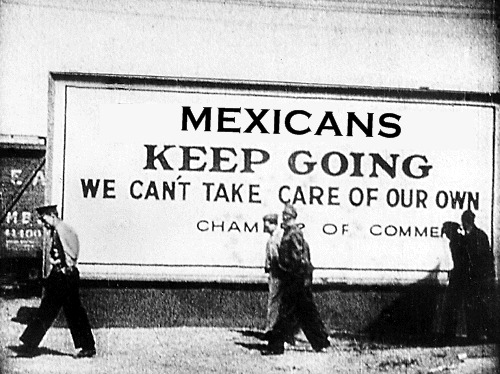Unwelcome

That plurality is not unique to America: throughout Europe, nativist parties, some of which were until recently avowedly neo-Nazi, have been growing in power. In France and Denmark, they've won control of the government, and they've done it by railing against migrants. They use the word "migrant" intentionally: if they were to admit that the current wave of Syrians fleeing the horrors of civil war in their native country are refugees, they'd have to let them in and accord them rights. Migrants, on the other hand, can be turned away.
It's also not unique to this moment in history. In fact, nativism has been a constant of American identity since the founding of this nation. Whether the immigrants were identified as German, Irish, Polish, Jewish, Catholic, Mexican, Chinese, Japanese, Hungarian, Vietnamese, Ethiopian, Arab, Muslim, Serbian, Bosnian, Somalian, or any of the other kaleidoscope of colors, nationalities, ethnicities, and faiths seeking a better life in this still-sparsely-populated land, there have been significant numbers of nativists seeking to restrict or prohibit their entry and, once they have arrived, to send them back where they came from.
Nativism is a frame of mind with no appreciation for subtlety or irony. American nativists are immune to the reminder that, compared to the people who were living her prior to 1492, they are the newcomers, all of them descended from people who were themselves unwelcome when they first arrived.
And yet, no ethnicity has been more repeatedly rejected than those who, prior to coming to the United States, spoke Spanish. I've recently learned about a mass deportation program--euphemistically referred to at the time as "repatriation" because, as in present-day Europe, semantics matter--that, between 1929 and 1936, shipped between 500,000 and 2 million Americans of Mexican descent, the majority of them legally citizens of the United States, to Mexico. The justification for the deportation was protecting the jobs of real--that is to say, white--Americans during the Great Depression; the rationale for paying no regard to the actual citizenship of those deported was keeping families together; and, as with the internment of Japanese-Americans a few years later, promises of compensating the deportees for their losses were often forgotten. The center of this movement was Los Angeles County, a municipality that picked the word "repatriate" because deportation was an action restricted to the federal government. Los Angeles also happens to be a place with a Mexican name, founded by Mexicans, and populated, prior to the Repatriation, by many Mexican-descended families whose heritage extended back generations.
While Repatriation started in Los Angeles, it quickly became a popular political cause, especially as beleaguered President Herbert Hoover sought to lay blame for the Depression on a labor surplus. "Go home to your own people, your own language" made sense to Anglos fearing a future without work, resentful of "foreigners" receiving government assistance. Once the federal government became involved, it commandeered trains and buses or, in some cases, simply told Mexican families to pack whatever they could in their cars and trucks and drive south. At first, the deportees were simply dumped at the border, left to fend for themselves with Mexican immigration. As time passed, and a significant number of deportees simply walked back across to the United States, the program evolved to transporting the deportees much deeper into Mexico and paying them a benefit to stay there.
The popularity of the program waned as the 1930s drew to a close, and jobs became more available. Pearl Harbor marked the real end of the program, as with the entrance of the United States into World War II, the economy found itself with a job surplus. The revitalized barrios were not to remain welcoming places for long, though: in 1954, the INS launched a program called--I'm not making this up--Operation Wetback, which deported more than a million people, many of them, again, American citizens. Deportation is, in fact, a theme in American history going back at least to 1882 and the Chinese Exclusion Act--a policy that led to large waves of Mexican immigration to take the place of Chinese laborers as railroad construction workers. Downturns in the economy--an early version of the Repatriation took place in the mini-depression that followed World War I--are the usual triggers for the institutionalized xenophobia that robs millions of their rights, deporting them without due process.
These deportation programs are America at its ugliest. As I've often stated, America's greatest beauty lies in its diversity: there is no one ethnicity, religion, skin color, or dialect that can be called standard American. While the majority (soon to be plurality) of American citizens are white and protestant, American culture has never been homogeneous, as our music reveals: country-western music, that deemed by many to be the most quintessentially "American" by Republican voters, would not exist without the influence of Celtic and African rhythms, harmonies, and forms; and don't get me started on jazz, rock, and pop. It is the diverse roots of American culture that makes it so appealing to the rest of the world.
I experienced this first-hand during my two years in England. Morris dancers are the most iconic British folk performers. They're also the most ridiculed by British popular culture, which is fascinated with American styles and forms.
The challenge for the American right is to acknowledge the fears that give rise to nativism, soothe them, and find a way to embrace the fact that every American, however white, however protestant, is and always will be profoundly cosmopolitan; that this is the very nature of being American, and that excising any part of this blended identity costs us far more than it saves. No candidate can seriously claim to represent the national ethos while appealing only to its ugliest plurality.


Comments
Post a Comment